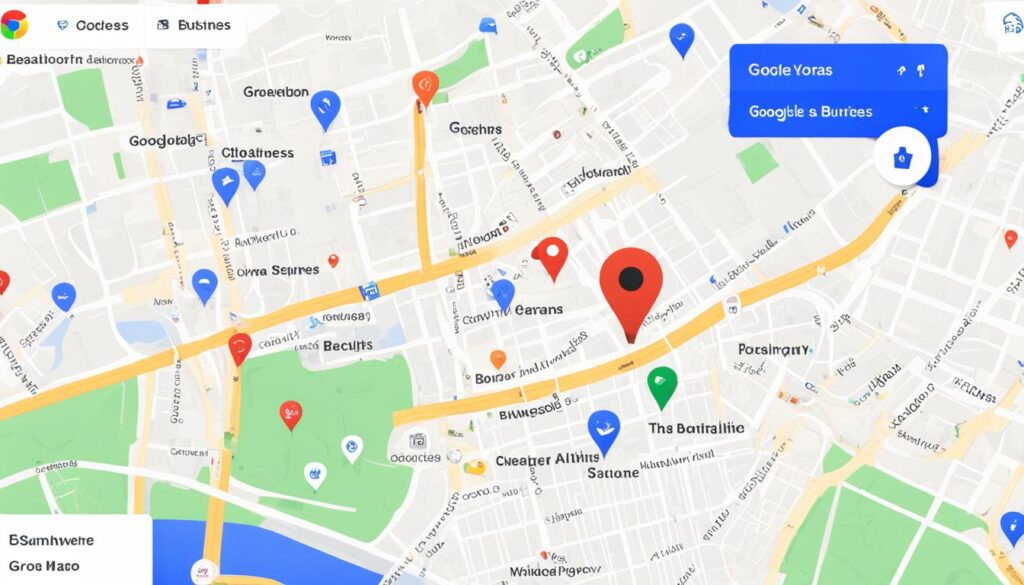Did you know that 46% of all Google searches are looking for local info? That’s almost half of what’s searched! Most queries are about products or services in a specific place. This fact shows the huge importance of using local SEO keywords for businesses.
Adding location-specific words to your SEO can change the game for getting local customers. By wisely picking these keywords and checking how they perform, companies can show up more in local searches. This can lead to more people visiting their sites and making purchases.
Key Takeaways:
- 46% of all Google searches ask for local info, showing local SEO is crucial.
- Using location words in your SEO can make your business more visible locally.
- To get more local customers, mastering local SEO keywords is key.
- Knowing how to use and check the success of location terms is vital for your SEO.
- For top online success, businesses should focus on being seen in local searches.
Understanding Geographic Keywords in SEO
Optimizing your online presence for local search results involves using the right geographic keywords. These are phrases tied to a specific location. They draw local traffic and customers to your site.
Knowing different types of geographic keywords is key. Let’s discuss some important ones:
- City or town names: These include specific city or town names. They work well for businesses focusing on a local area. Examples are “New York City SEO services” or “Chicago pizza delivery.”
- State or province names: They target larger areas like states or provinces. This can broaden your reach locally. For instance, “California real estate” or “Texas car dealerships.”
- Neighborhood or district names: For businesses in certain areas, these keywords are vital. Examples include “Brooklyn coffee shops” or “Miami Beach hotels.”
Strategic use of these keywords in your site’s content can boost local search results. Place them in your content, meta tags, and headings. This helps you catch the eye of local customers looking for what you offer.
Adding geographic keywords to your strategy is like mapping your business for search engines. It helps them know where you are and who you’re trying to reach.
Also, put these keywords in your page titles, URLs, and image alt tags. This shows search engines you’re relevant to local searches.
Why are geographic keywords important for local SEO?
They’re vital for a strong local SEO approach. They tell search engines where you are and who you serve. By using them smartly, you:
- Bring in more local visitors: The right keywords draw more local people to your site, boosting sales and conversions.
- Outshine competitors: Locally targeted keywords set you apart from those not optimizing for locals.
- Grow your local customer base: With the right keywords, you attract more visitors to your store or services.
But just using these keywords is not enough. You also need valuable and relevant content. This could include local news, events, or tips. Such content enhances user experience and boosts local rankings.
Let’s dive into effectively using geographic keywords in your local SEO strategy.
Implementing Geographic Keywords in Local SEO
Adding geographic keywords is key in local SEO. It boosts your visibility online and draws in local customers. Start by doing deep keyword research to find the best words for your business.
Think of keywords that fit your business and area. Imagine what your ideal customers would search for. This will help you create a strong list of keywords to use.
Now, it’s time to work these words into your site. Sprinkle them naturally throughout your content. Use them in meta tags, titles, and headings too.
But don’t overdo it. Too many keywords can hurt your site’s ranking. Keep your content natural for your readers.
Here’s where to put these special keywords on your site:
- Website content: Make sure your site talks about your area and business in a helpful way.
- Meta tags: Your title and description should have these keywords to stand out in searches.
- On-page elements: Use them in headings, image descriptions, and links. This helps search engines see what your site is about.
By following these tips, you’ll boost your site’s local search rank. SEO work doesn’t show results overnight, so keep at it. Review and adjust your strategy regularly.
Example Implementation of Geographic Keywords in Website Content:
I help businesses in Denver, Colorado with their local SEO. I find the right keywords and use them to make their content better. This includes fixing meta tags and using the right words in all parts of the site. With my work, businesses get seen more in local search results. They attract more local customers.
Keep improving your local SEO strategy by staying informed. Watch for changes in search trends and market needs, and adjust your approach. Next, we tackle the challenges of using geographic keywords in local SEO and how to beat them.
Implementation Steps for Geographic Keywords in Local SEO
| Steps | Description |
|---|---|
| 1 | Conduct thorough keyword research |
| 2 | Identify target keywords specific to your business and location |
| 3 | Optimize website content with geographic keywords |
| 4 | Incorporate geographic keywords in meta tags and on-page elements |
| 5 | Maintain a natural flow without excessive keyword usage |
| 6 | Regularly monitor and evaluate the impact of your implementation |
Challenges in Using Geographic Keywords
Adding geographic keywords to your local SEO can boost your rankings and draw in local people. But, there are two big issues. These are keyword cannibalization and keyword stuffing.
Keyword Cannibalization
If too many pages on your site target the same location keyword, it’s bad. Search engines get confused and may not know which page to pick. This confusion could cut your website’s visibility and traffic.
To fix this, do deep keyword research. Make sure each page has its own location keyword. This helps avoid confusion and increases your local search ranking chances.
Keyword Stuffing
Putting the same location keyword too many times in a page is not cool. It might seem good to do this for better ranks, but it’s risky. Search engines can tell and might penalize your site for it.
Focus on great content instead. Use location keywords smartly and naturally. Make sure everything reads smoothly. This not only boosts your SEO but also makes your site nicer to visit.
Getting past the hurdles of location keywords is key in local SEO. With targeted research, and by avoiding these pitfalls, you can climb the search ranks. This helps you meet more local visitors and get seen more online.
The real aim is to make your site keyword-rich in a way that feels natural. Balancing this well can really help improve your local SEO.
| Challenges | Impact | Solution |
|---|---|---|
| Keyword cannibalization | Decreased visibility and traffic | Conduct thorough keyword research and optimize individual pages with different geographic keywords. |
| Keyword stuffing | Penalties from search engines | Create high-quality content, incorporate geographic keywords naturally, and avoid excessive keyword usage. |
Measuring Success of Geographic Keywords in Local SEO
It’s important to check key stats to see how well your site does with geographic keywords in local SEO. Keep an eye on where your website shows up in search, its traffic, and metrics from Google Business. This helps you figure out if your local SEO is working.
Keyword Ranking
Looking at how your keywords rank is key. Use tools to watch where your site sits for certain search terms. Knowing this helps you see what’s working and where you can make your site better to be more visible locally.
Website Traffic Analysis
Measuring your site’s traffic shows you if your keywords are drawing people in. This includes looking at how many come to your site and what they view. Seeing trends can tell you a lot about what’s working and what’s not, which lets you tweak your SEO plan.
Google Business Insights
Google Business Insights is a goldmine for understanding how people find you locally. It covers searches, calls, and visits to your site. It’s great for learning how well your keywords drive action and what you can do to engage more with folks nearby.
| Metrics | Description |
|---|---|
| Keyword Ranking | Monitors your website’s ranking for specific geographic keywords. |
| Website Traffic | Analyzes the number of visitors and page views to assess the effectiveness of your keywords in attracting organic search traffic. |
| Google Business Insights | Provides data on how customers are finding your business through local search, phone calls, and website visits. |
Keeping a close eye on these metrics helps you make smarter SEO moves and get seen more in local searches. Data on keyword ranks, web traffic, and Business Insights guides you in picking the right geographic keywords. This positions your business better in your local area.
Importance of Local SEO for Your Business
Local SEO is key for your business’s online presence. It boosts how often your business pops up in local search results. By using local keywords, you draw in more customers from your area.
It aims to catch the eye of people nearby. This is great for shops or services that serve the local community.
With the right local SEO, your business can rank high online locally. This means more people from your area see you first when they search. More online visits from locals means more business for you.
Online Visibility
Local SEO makes your business more visible in online local searches. Using local keywords tells search engines you’re a relevant choice for the area. This lands you a top spot in local search pages.
This visibility isn’t just for show. It helps local customers find you when they’re searching for what you offer. This can turn their visits to your website into actual sales.
Attracting Local Customers
Targeting local keywords grabs the attention of customers near you. They show more interest in nearby businesses. This means you could see more local people using your services or buying your products.
Local SEO helps you specifically reach these nearby customers. It boosts your chances of making sales and gaining their loyalty.
Relevance in Local Search Results
Local SEO places your business front and center in local search results. So, when people search for what you offer nearby, your name is more likely to pop up. This increases your chances of being seen and chosen.
High rankings boost your brand’s image and trust. This helps people see you as a reliable local option. It also puts you ahead against those not focusing on local SEO.
Making your business friendly to local searches is crucial. Local SEO can make you more visible, attract local support, and lead in local searches. Putting effort into local SEO can really boost your business’s success. It’s a smart move for growth.
Optimizing Your Google Business Profile
Improving your local search appearance means focusing on your Google Business Profile. This profile is like your shop’s window on Google. By optimizing it, you make it easier for customers to find you online.
Follow these key steps to make your business profile stand out:
- Accurate and Detailed Information: Give complete, up-to-date info about your business. Include your address, phone, website, and hours. This helps Google show your profile in local searches.
- High-Quality Photos: Upload photos that highlight what you offer and your place. Good pictures can draw in local customers and give a good impression of your business.
- Customer Reviews: Keep an eye on and answer customer reviews. Encourage happy customers to share their good experiences. Deal with bad feedback kindly and quickly. Reviews can sway new customers and shape your online image.
Using these steps can really boost how often you show in local searches. A well-tuned Google Business Profile can get you into the Local Pack, on the Knowledge Panel, and on Maps. This can help you connect with more local people.

Case Study: The Impact of Google Business Profile Optimization
“After tweaking our Google profile, we showed up more online. We were in the Local Pack more and noticed more people finding us on Google Maps. Optimizing really helped us bring in more local shoppers and grow our business.” – John Anderson, Owner of ABC Bakery
This story shows how powerful it is to work on your Google Business Profile. By keeping your profile updated, you can boost your online presence, catch more local customers, and make your business thrive.
Conclusion
For any business, getting a handle on local SEO is key to boosting their online presence. This step helps them draw more folks from around the area. Learn why geographic keywords are crucial, how to use them well, and check your progress. You’ll see your name pop up more in local search results.
When you weave geographic keywords into your site’s content, meta tags, and other spots, your business shines online. You then stand a better chance of showing up in searches your local customers make. This gets you closer to those who need what you offer, upping your chances to win them over.
Figuring out if your geographic keywords work is must-do work for your local SEO work. Keep an eye on how well your keywords rank and study the traffic to your site. Tools like Google Business Insights can provide a lot of helpful info. This data is golden, helping you tweak your strategy for better visibility.
So, nail local SEO and put geographic keywords to work for you. This way, you grab more attention and interest from those close by. Then, watch your business thrive in the tough local market.
FAQ
What are geographic keywords in local SEO?
Geographic keywords are special phrases for local places. They make your website show up better in local searches. This brings more people nearby to your site.
How do I implement geographic keywords in my local SEO strategy?
First, pick the right keywords for your area. Then, use them in your site content and tags. This makes your website more visible to local searchers.
What challenges may arise when using geographic keywords in local SEO?
Sometimes, you might face keyword overlap across your pages. Or, you could use a keyword too much. To win, you need to tackle these issues head-on when using local keywords.
How can I measure the success of geographic keywords in local SEO?
Track keyword positions, website visitors, and insights from Google Business. Tools can help evaluate your keyword rankings and check on your web traffic. Google Business Insights offers insight into how people find you.
Why is local SEO important for businesses?
It boosts your spot in local online searches. This way, nearby customers can easily find what they need from your business.
How can I optimize my Google Business Profile for local search?
Fill it with accurate info and eye-catching photos. Also, stay on top of customer reviews. Doing this will make more local people notice your business online.








